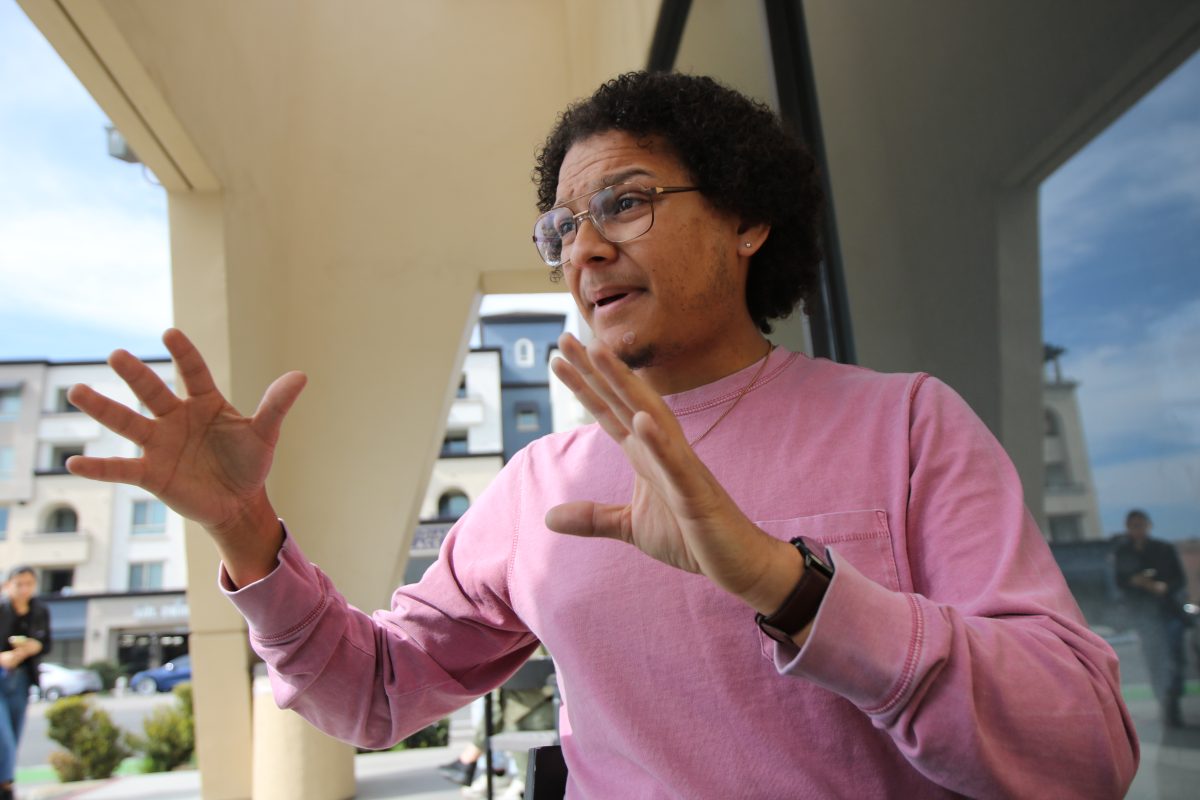Kelly Moreno, contributing reporter

With one question on their minds, the duo Clark Stiles and Nathan Kyhber otherwise known as The Good Listeners, set out across the nation to find the answer. The question they ponder: is it worth risking it all to pursue the dream of a famous career in music?
To find this answer Stiles and Kyhber enlisted the help of local musicians in cities spanning the country. As they traveled 24 days, they recorded and incorporated the musical talents of musicians they met along the way in a collection entitled, “Don’t Quit Your Daydream.”
While traveling, the pair kept video record of each day on their trip, and it is currently released as a documentary sharing the same title as the album, “Don’t Quit Your Daydream.”
Stiles and Khyber were once part of an up-and-coming band named Absinthe. However, the band had a fallout nearly a decade ago. Unhappy with their day jobs, Stiles and Khyber let the past go, and created The Good Listeners. Their debut album entitled “Ojai” was released in 2005, and shortly after they were enlisted to write “Time will Tell,” for the 2006 movie “The Devil Wears Prada.”
The Good Listeners are essentially alternative; however, their approach to song making is new and creative. The following is a lyric from one of the songs from “Don’t Quit Your Daydream,” entitled “Lake Life”: “Just to be clear, it’s nice to see your face ‘round here, it’s been a long time, I miss the sunshine, how it falls on the lake of our lives.”
“Lake Life” blends vocal harmonies, rhythm guitar, percussion, as well as many other instruments. In one album, the Good Listeners created 12 very different tracks ranging from upbeat melodies to haunting harmonies.
After hitting the age of 40, despite the obstacles they had faced, the two had decided to continue to chase their dream and accomplish a career in music. They were faced with many skeptics claiming that they couldn’t accomplish their goal of creating their “dream album” at their age. Disregarding all of the criticism, the two rented a RV, armed with a camera crew, and headed east, starting from Los Angeles, California.
Stiles’ and Khyber’s first stop was in Joshua Tree, California. There they met up with Bingo Richey in The Integration Building where they created their first track. Bingo speaks candidly of his everpresent dream of being a famous musician. The Good Listeners enlist his musical ability to enhance a track that they recorded during their stay in Joshua Tree.
During their adventure across the nation, Stiles and Khyber had the actor/musician Adrian Grenier assist in the recording of two of the twelve songs on the soundtrack: “Eight Steps Away” and “Chemtrails.” In addition to Grenier, the duo met with Linda and Lane, small time musicians in the rural city of Madrid New Mexico, Paul from Dallas, Texas, who integrates 1980s games sounds into music and Daddy Mack from Memphis, Tennessee, who specializes in blues music.
The documentary follows two men chasing their dream of being musicians, despite their everpresent obstructions. Though often times hilarious interactions with local musicians, The Good Listeners finally find the answer to their question that began this journey. Millions of people risk it all to do what they love—and that is to play music.
Q&A with The Good Listeners
Nathan Khyber of the The Good Listeners sat down with the Daily Sundial to discuss their documentary, “Don’t Quit Your Daydream,” a film that explores how aspiring musicians hang on to their dream.
What musicians had the biggest influence on you two as children growing up?
As a kid, I was really into John Denver, ELO and early Chris De Burgh records. My parents were big Elvis and Cash fans so my sis and I were always playing those 45’s as well, and later came my fascination with New Wave and The Beatles.
What inspired your career in music?
In school, the band I played in had the pleasure of playing the Catholic girls school summer dance twice one year, and this warped our perception of what life might be like from there on out. So probably it was hormonally inspired.
What does the name “The Good Listeners” mean? And why did you choose that name for your band?
Our good friend Miranda Lee Richards was asked to sit down at our rehearsal with headphones and jot down whatever came to mind, and out of the 11 or so names we laughed a bit when we got to that one. I think it stuck because it reminded us of what everybody wants in a mate or friend.
Was this documentary a mission of self-discovery? Or was its goal to send a specific message to the audience?
Everything we do is an experiment primarily set up to get different musical results than we would get if we were stationary. The very loose theme of the film inquired why people, especially now that the music business is in a billion pieces; continue to do what they do in spite of reason and common sense. We were hoping maybe for more of that concrete moment where we discover the answer to why The Good Listeners forge ahead seeking this lightning strike that allows us to continue making more recordings. But in the end it all boiled down to the fact that music is far better felt than studied and people make it for very illogical, heartfelt, human reasons.
What element of this journey was the most important, and why?
The majority of the film’s first half centers around older musicians who play music as a way to express themselves around a campfire or make a little money or keep their culture alive. It was important we felt to have younger players for the last part of the trip and when we finally got to the School of Rock in Philadelphia, I think this allowed us to reconnect with the reason we went down the rabbit hole to begin with … and that added a strength and vitality to our film’s closing. All of the hurdles that lay in our path became kind of silly and we started to act in accordance again. Our strongest songs on the album, for once in our careers, occurred at journey’s end when we were exhausted and pissed off at the whole thing. Usually that’s not the case, be tend to write the best tracks at the start of an album.
What did you both learn about music and stardom after completing this documentary?
The pursuit of fame is a potentially bleak affair and if you let it motivate you, your self integrity will be at stake. I think if you have something to celebrate, then it’s a whole different story. We’re having to find balance like everyone else between being commercially aware and being artistically sound and that can be a challenge. Music has always been the one thing that has made sense.





